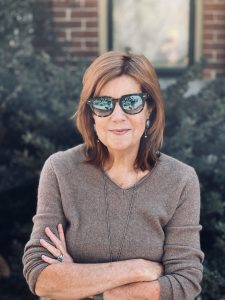
Q: You’re from New Bedford! Hello. Can you tell us about your roots and growing up here?
Janine: I grew up in the North End, where my dad owned Bourassa Hardware. I went to St. Joseph’s School (K-8), then Holy Family High School, where I was on the debate team, and lots of other stuff as well.
Memories: Summers—when not working at the store—with family and friends at Brooklawn Park, East and West Beach, Lincoln Park, Horseneck Beach. Cruising down Acushnet Avenue. Ice cream at Frates. Fish and chips.
I always have loved “coming home.” When I got married, we had our rehearsal dinner at Davy’s Locker, a longtime favorite. When our girls were little and visiting mémère and pépère, they loved the beach and the boats, and my dad bringing home linguiça pizzas.
I still get back home each year. My sister lives in Acushnet, and I have a brother in Dartmouth and another in Barrington, R.I. I miss the ocean, great seafood, and New Bedford accents surrounding me, which I pick back up after being home a day or two.
Q: How did you get involved in ending ageism and did New Bedford influence your thinking?
Janine: Changing the Narrative started in 2018. I was getting ready to step away from my consulting firm. A friend called, stating she was going to start an anti-ageism initiative and wanted me to lead it. I agreed, and the stories I heard that year in 42 in-person workshops made me a passionate advocate for ending ageism.
One day, I was facilitating a workshop in one town in western Colorado. Women my age were stuffing the refreshments in their tote bags. When I sat down with them, they shared that they were trying to live on $500-$600/month of social security, that they needed and wanted to work and that no one would hire them. I was stunned, having seen Help Wanted signs in almost every store in town. It was then that I really saw the impact of the pervasive ageism in our culture.
It was contrary to what I had absorbed in my ethnically diverse, intergenerational neighborhood in New Bedford. My mom’s parents lived upstairs, and my dad’s parents just a few blocks away.
My dad worked into his 70s lugging cartons of paint in the store, and loved speaking to the “old timers” who would huddle around the radio listening to Red Sox games while their paint was being mixed.
My mom was an incredible role model for age not being a barrier to pursuing our dreams. She had always wanted to go to college, and so in her late 50s told my dad that she was going to start at SMU. She graduated four years later magna cum laude and fluent in four languages: her native French, English, Portuguese, and Spanish. I saw aging as a positive, not a negative.
Q: What is Changing the Narrative about? Where are you seeing your greatest impact?
Janine: Changing the Narrative is at its heart a U.S. campaign to end ageism. Although based in Colorado, last year people from all 50 states in the U.S. and 43 coun-tries outside participated in one or more of our programs. Our strate-gies are what research has shown to be effective in ending ageism: edu-cation about ageism and implicit bias; intergenerational connection; and working on policies and law that allow all of us to thrive at all ages.
The “fun” stuff like birthday cards are an effective way to edu-cate people about ageism. It allows people to talk about: What does it mean when typical birthday cards portray aging as all downhill?
Changing the narrative really means changing the stories that we tell about ourselves and allow others to tell about us. We want to move away from the stories of decline, deterioration, depression and dependence and share the true growth and opportunities for contribution that come with aging if we don’t allow ageism to get in the way.
Because we are surrounded by messages in our culture that younger is better, too often we find ourselves saying “I am too old to do, learn, or start that.”
We limit our own opportunities. And perhaps more important for our day-to-day lives is this: Research by Dr. Becca Levy of the Yale School of Public Health shows that negative thoughts about aging lead to negative effects on us. On the other hand, if we are able to think positively about ourselves aging, research shows that we will have better physical and mental health, memory, life span, and reduced likelihood of developing dementia. These are important reasons to pay attention to the thoughts that sur-round us and to fight back against ageist messages and actions.
Q: How do we combat ageism?
Janine: There are a number of things we can do—big and small—in our everyday lives, from speaking up when people make ageist remarks, to advocating in our communities for more age-friendly policies. We have an Ageism Activism Center on our website that can get you started. Go to https://changingthenarrativeco. org/ageism-activism-center/

Recent Comments